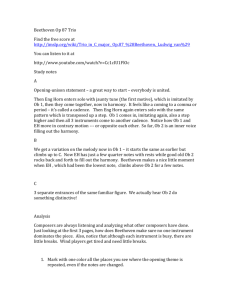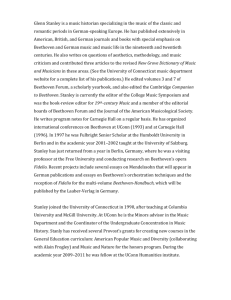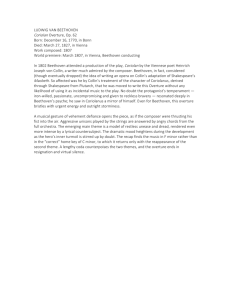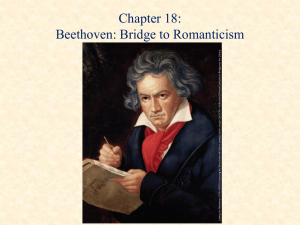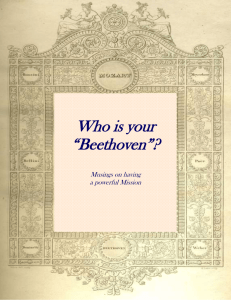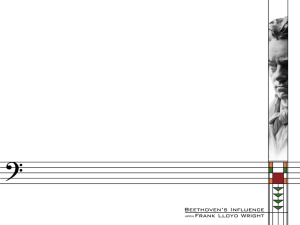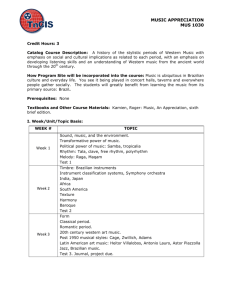Nationalistic Music
advertisement
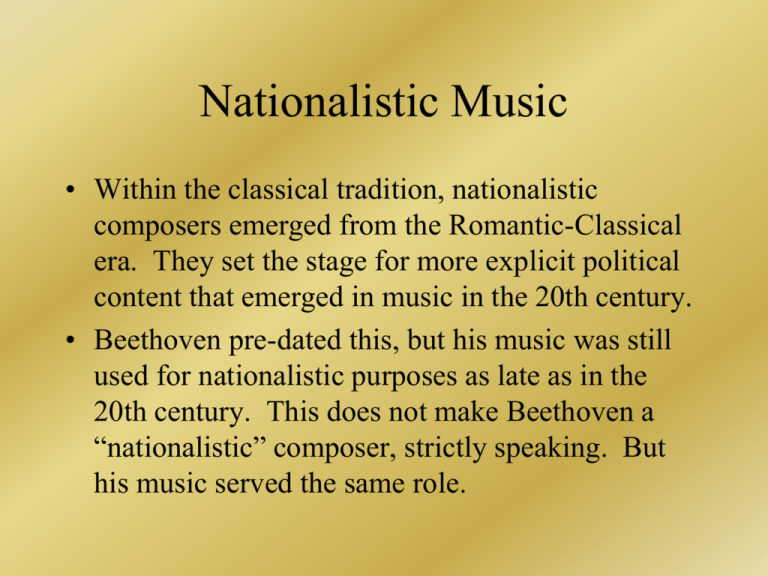
Nationalistic Music • Within the classical tradition, nationalistic composers emerged from the Romantic-Classical era. They set the stage for more explicit political content that emerged in music in the 20th century. • Beethoven pre-dated this, but his music was still used for nationalistic purposes as late as in the 20th century. This does not make Beethoven a “nationalistic” composer, strictly speaking. But his music served the same role. • In the post-World War II era, West German culture thoroughly distanced itself from the use of Beethoven’s music for any political purposes. Thus, we saw the cessation of the creation of Beethoven myths there. • However, in East Germany, a new Beethoven myth emerged which sought to describe Beethoven in revolutionary terms that found correspondence with socialist or communist thinking. • All this (on both sides of the German divide) ended with the post-cold war unification of Germany. • Beethoven’s music again became a symbol for the newly re-emerged German nation. • In particular, Beethoven’s Ninth Symphony was seen in starkly political terms. • Leonard Bernstein, in a concert in Berlin shortly after the collapse of East Germany in 1989, allowed the words to Schiller’s poem in Beethoven’s Ninth Symphony to be changed to “freedom” rather than “joy” so as to openly acknowledge the new and positive political use of the piece. • In this moment, Beethoven’s music was truly nationalistic, even though Beethoven himself was not. • But in the 19th century, nationalistic composers became something of a movement. • Nationalism in music was largely a response to the political upheavals of the 1800’s. • Newly formed or re-invigorated nations had populaces that had vibrant cultural identities that competed with the identities of other peoples in nearby nations. • Largely influenced by Franz Liszt. Liszt was a virtuoso pianist who wrote music that could display his performance capabilities. He also wrote works such as the “Hungarian Rhapsodies” that distinctly embraced musical themes that were nationally defined. • In other nations, other composers followed Liszt’s lead and wrote music that similarly expressed nationalistic themes that reflected domestic musical traditions as well as historical experiences. Modest Mussorgsky (1839-81) • Mussorgsky was one of five Russian composers (commonly referenced as “The Mighty Five”) who attempted to create music that would reflect the Russian experience. He and Nicolai RimskyKorsakov (1844-1908) were the most influential of the five. • For example, Mussorgsky wrote the opera “Boris Godunov” based on the Russian poet Alexander Pushkin’s tragedy involving the rise and fall of the Russian Czar Boris. • Mussorgsky expressed stark emotions in his music, emotions that most Russians could understand as part of a common historical legacy. Antonín Dvorák (1841-1904) • In what is now a major part of the Czech Republic (former Czechoslovakia), Dvorák wrote music with Bohemian themes, including folk dances that were incorporated into his music with striking innovation. “Slavonic Dance,” No. 8, opus 46 is a particularly interesting example of this. He often used the third movements of his symphonies to convey Bohemian musical content. (See Symphony No. 9). Jean Sibelius (1865-1957) • Even in his lifetime, Sibelius was somewhat of a national hero. • His work, “Finlandia,” is often compared with Tchaikovsky’s 1812 Overture with respect to its patriotic energy. • Most of his Sibelius’s symphonies are known worldwide, although he wrote many smaller pieces that are better known in Finland. • In general, it was Sibelius’s concentration on Finnish mythologies as well as his strong personal sense of Finnish nationalism that bonded he and his national compatriots together. Ralph Vaughan Williams (1872-1958) • Vaughan Williams worked with a variety of musical venues, including radio and film as well as the more traditional choral and chamber settings. • His interest was in British folk and cultural themes from his contemporary times to more deeply historical periods. • Two works by Vaughan Williams of particular interest are his well-known “London” Symphony No. 2 and the “Fantasia on a Theme of Thomas Tallis.” Isaac Albéniz (1860-1909) • Albéniz was one of the great Spanish musical originators who infused the Romantic era with music with a Spanish flavor. • Manuel de Falla and others followed his lead. Manuel de Falla (1876-1946) • Manuel de Falla infused the classical style with distinctly Spanish motifs. • In particular, see the ballet, “The ThreeCornered Hat.” Charles Ives (1874-1954) • Early American composers followed European traditions. Ives was the first who broke from that mold and created truly “American” music. • Creating a path of combining unconventional rhythms with dissonant tone combinations, Ives pioneered a departure from existing musical expectations. • Other American composers were equally radical in their approach to creating an “American” style of music. • John Philip Sousa (1854-1932) • Scott Joplin (1868-1917) • Aaron Copland (1900-90)
